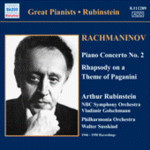
Rachmaninov: Piano Concerto No 2 / Rhapsody on a theme of Paganini (Rec 1946-1950)
 $25.00
Out of Stock
$25.00
Out of Stock6+ weeks add to cart
SERGEI RACHMANINOV
Rachmaninov: Piano Concerto No 2 / Rhapsody on a theme of Paganini (Rec 1946-1950)
Artur Rubinstein (piano) / NBC Symphony Orchestra / Vladimir Golschmann
[ Naxos Historical Great Pianists / CD ]
Release Date: Sunday 19 February 2006
This item is currently out of stock. It may take 6 or more weeks to obtain from when you place your order as this is a specialist product.
""Though many collectors already own the RCA Rubinstein Edition, they may gravitate to these restored-sound inscriptions made possible through Mark Obert-Thorn and the Naxos label."
(Audiophile Audition)
"Though many collectors already own the RCA Rubinstein Edition, they may gravitate to these restored-sound inscriptions made possible through Mark Obert-Thorn and the Naxos label. Artur Rubinstein (1887-1982) played relatively little Rachmaninov, considering the vast scope of his repertory, but he did inscribe the C Minor Concerto four times, and this, from 27 May 1946 at Carnegie Hall, features some fast tempos and luxuriant tone. Working with the amiable Vladimir Golschmann (1893-1972), Rubinstein finds a conductor who accommodates the several deviations from the composer's text, especially as the left-hand part of the last movement often eludes Rubinstein's technique. In the 1950s, Rubinstein encountered similar problems in recording Rachmaninov with Fritz Reiner, and more than one Chicago Symphony musician made invidious comparisons to their work with Kapell, with whom music had proceeded more smoothly. Still, the 1946 performance exudes some fierce moments of excitement, and Rubinstein knows how to graduate a climax for maximum effect.
The Rhapsody recording dates from 16-17 September 1947 for HMV on Abbey Road, evincing a high level of sound from the keyboard, upon which Rubinstein insisted. Rubinstein takes the three major sections of the Rhapsody rather programmatically, as a developing love-scene of the great violinist, who celebrates his dazzling technique, his amatory potential, and his contest with the forces of death. Despite the several takes required to complete the project, the performance proceeds seamlessly with its edits, the elan, speed, and excitement of the realization primary. The justly famous 18th Variation becomes a paean to both Rubinstein and the composer's ability to find dazzling melody in an inversion of the A Minor Caprice. The equally ubiquitous Prelude in C-sharp Minor, the one solo piece by the composer Rubinstein recorded (twice, once in 1936 and this from 11 December 1950) is enjoys a taut, fast-paced lyricism, what Rubinstein once characterized as 'brazen sweetness.'"
--Review by Gary Lemco, Audiophile Audition
Tracks:
Piano Concerto No. 2 in C minor, Op. 18
Rhapsody on a Theme of Paganini Op. 43